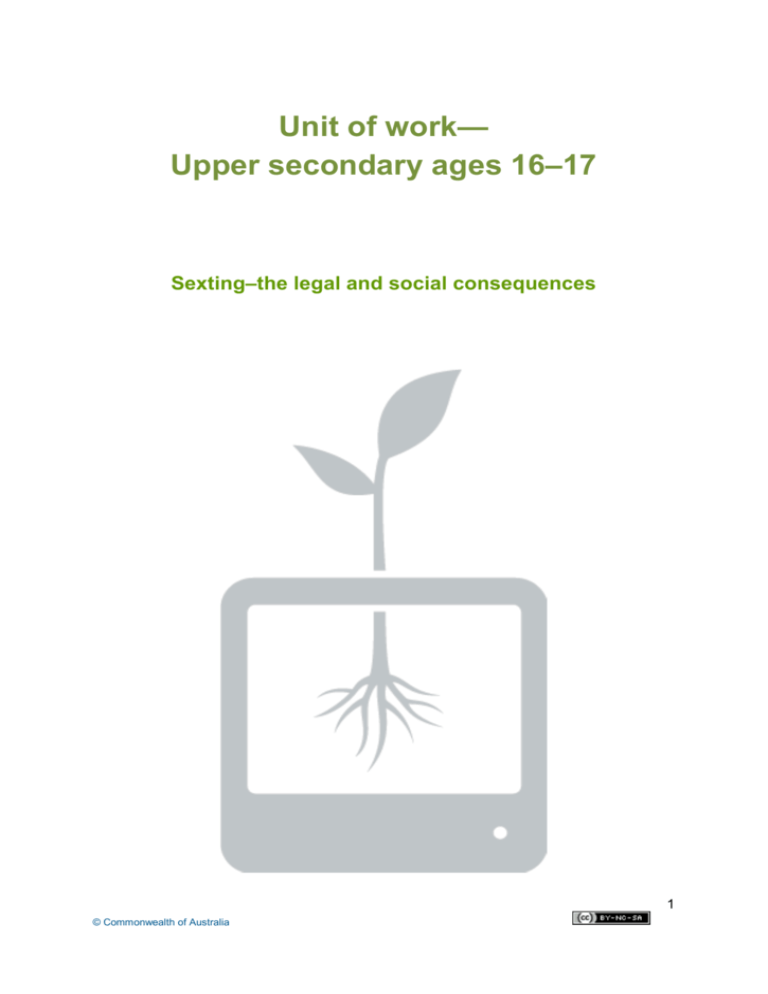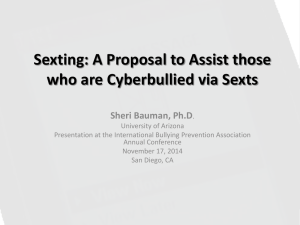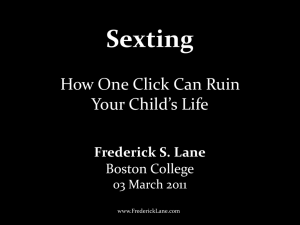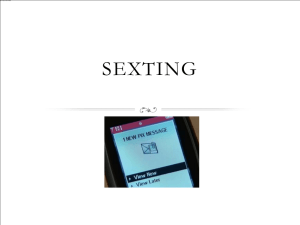
Unit of work—
Upper secondary ages 16–17
Sexting–the legal and social consequences
1
© Commonwealth of Australia
Sexting—the legal and social consequences
Upper secondary lesson plans
Introduction to the lesson plans
Two lesson plans have been developed for use with senior secondary students. It is
recommended that the first lesson plan, a Powerpoint presentation, be delivered to all
students as it explores what sexting is and the key issues. This can also be delivered as a
large group presentation.
The second lesson plan aims to encourage students to consider the impact peer pressure
has on sexting and to develop strategies to manage pressure for themselves and peers and
considers the legal implications.
Background
Sexting is the sending of provocative or sexual images or messages generally using a
mobile phone. Sexting can have serious social and legal consequences for students.
Some teens use sexting for fun, as a way of flirting, for popularity or in response to peer
pressure, particularly within romantic relationships.
Sexting can have serious unforseen consequences for young people. For example, a 16
year old girl sent an explicit video of herself to her boyfriend. After their relationship ended
he posted the video on a social networking site that could be accessed by their friends,
family and teachers. This impacted on the way others viewed her and her relationships with
family, school staff, friendships and the wider peer group.
Sexting images may also be used by others to cyberbully a young person. Images of a
sexual nature may attract ill-intentioned individuals including adults seeking young people for
sexual purposes.
Importantly sexting may also be considered a criminal offence even if all parties are willing
participants. Sexual images of minors may be considered child pornography and carry
charges related to the creation and distribution of child pornography, even if the image is
created and distributed only for use within a relationship.
There is currently no reportable research into Australian teen sexting behaviour. Focus
group research of American teen’s mobile phone use by the Pew Research Centre revealed
that only four per cent of teens surveyed reported sending a ‘sext’ while 15 per cent reported
having received a ‘sext’. Most teenagers reported that were aware of the issue but were not
involved in it. The same study showed that 47% of teenagers regretted sending some of the
messages they had sent. (Lenhart, A., Ling, R., Campbell, S. & Purcell, K. 2010. Teens and
Mobile Phones Retrieved on 21 December 2010 from
2
© Commonwealth of Australia
http://www.pewinternet.org/Reports/2010/Teens-and-Mobile-Phones/Chapter5.aspx?view=all).
Lesson Plan One
Sexting—the legal and social consequences
Introduction
This lesson covers the definition of sexting and introduces the social and legal
consequences of sexting. It also explores some basic tips on how to resist pressure to
participate in sexting and how to help friends who have participated.
The lesson is designed to be presented to either a large group, such as a Year 11 or 12
pastoral care session, or a single class. Resources for this lesson include:
1. a link to a video to prompt student discussion;
2. a handout for student consolidation of issues; and
3. Cybersmart Sexting Power-Point presentation downloadable from
http://www.cybersmart.gov.au/upp-sec-lp,aspx.
Materials
You will need:
1. either individual computers with internet access for students to view video materials
on, or an Interactive Whiteboard or projector connected to the Internet to enable the
video to be shown to the group;
2. either an Interactive whiteboard/projector for the Powerpoint presentation, or printed
handouts of the slides; and
3. copies of the handouts provided within this Lesson Plan for small group work.
Time: 45—60 minutes
3
© Commonwealth of Australia
Aims
This lesson aims to help students to:
increase awareness of the social, ethical and legal consequences of sexting; and
prompt students to identify strategies to manage sexting issues.
Objectives
By the end of this lesson students will be able to:
identify how sexting incidents occur amongst teenagers;
respond critically to sexting issues including how to protect themselves and others;
and
critically analyse the legal and social consequences of sexting
Introduction (5 mins)
Introduce the topic of sexting as a modern phenomenon. Sexting is the sending of
provocative or sexual images or messages generally using a mobile phone. Sexting can
have serious social and legal consequences for those who create and share sexts and those
who view and forward them to others.
Below are some questions you may consider to prompt initial discussion and consideration
of sexting and the legal and social consequences.
What are the potential consequences of sharing naked or sexual images or videos?
What are the differences in how young women and men view romantic and sexual
relationships, and how does this impact on the use of sexting?
What can young women and men do to say no to sexting and protect their
reputations?
How can friends and other students help to stop sexting and support teens who may
be suffering bullying or emotional stress after an incident becomes public?
4
© Commonwealth of Australia
Activity one:
Preparation
1. Preview the PowerPoint for a large group presentation. Print Powerpoint slides and
teacher notes.
2. Select a media source to start the activity.
The four suggested sources are:
a. View the video ‘Megan’s Story’ on Think U Know at
http://www.thinkuknow.org.au/site/megansstory.asp. The two minute video
depicts a teenage girl's experience of sexting an inappropriate image of
herself to a boy in her class and the unintended social consequences for her.
b. View the video ‘Exposed’ at http://www.youtube.com/user/ceop. The ten
minute video from the UK depicts the story of a girl in her late teens who
shares naked images with her boyfriend. The images end up on the web and
she is harassed at school. The story shows how quickly images can be
shared and control lost. It focuses on the need to retain perspective and hope
even when all seems hopeless. It also focuses on the need to take personal
responsibility for actions.
c. View the video ‘Photograph’ (needs to be purchased by the school from
http://www.cybersafekids.com.au/2010/06/photograph-a-film-about-sextingand-cyber-bullying/). This fifteen minute video depicts the story of a teenage
girl who agrees to her boyfriend’s request for a naked image that he
subsequently shares with others after they break up. It shows the potential
legal and social consequences for young people creating and sharing sexual
images.
d. Read the case study in the ‘Stories’ section on the Say No To Sexting
website at http://www.sayno.net.au/stories. The case study depicts the story
of a 13 year old girl who shared a naked photo with her boyfriend. The photo
ended up being shared and the girl is harassed at school. The story provides
the girls viewpoint, her best friend’s viewpoint and the youth counsellor’s view
point with simple tips for how to manage sexting pressure.
3. Print out Handout 1 to give to each student.
5
© Commonwealth of Australia
The activity
1. Start your selected media source, ask students to consider their responses to
Handout 1 as they view the source.
2. Ask students to talk through the issues in Handout 1. Groups should discuss each
question and write down key points to address each issue. (5-10 minutes)
3. At the end of the media source stress the following to students:
a. individual responsibility is essential with sexting.
b. sexting can be illegal
c. sexting can have social consequences
d. they can get help if they have been involved in a sexting incident
e. the consequences can be serious but they can get past it with support from
friends, family and school.
4. Provide students with copies of the Powerpoint slides.
5. Start the Powerpoint presentation. Inform students that the presentation will reiterate
the critical things they need to know about sexting.
6
© Commonwealth of Australia
Handout 1
(Use selected media source as a prompt for consideration of
these issues)
Sexting Presentation
1. Were you aware of sexting, either through personal experience or
through having heard about it happening to others or celebrities? What
were the outcomes like for people involved? (no names of people from
school please)
2. Why is sexting potentially illegal? Should it be?
7
© Commonwealth of Australia
3. Do you think sexting is risky? What are the risks? Are there risks if
sexting is just done within a relationship?
4. What may happen to the person who receives a sext? What if their
parents find it on their phone? What if they share it with a friend? Are
the potential consequences different?
8
© Commonwealth of Australia
5. Who would you seek advice from if you had sent a sext and it had gone
wrong (been shared with others, uploaded to the internet etc.)?
6. What advice would you give a friend who was worried about a sext they
had sent or received?
9
© Commonwealth of Australia
7. What effects could sexting have:
a. on a person’s reputation?
b. on family and friendships?
10
© Commonwealth of Australia
c. on future employment prospects?
d. on a future romantic relationship?
11
© Commonwealth of Australia
8. Thinking about the video clip from Megan’s Story or Exposed to what
extent is sexting and pressure to share images a problem for teens?
9. What can you say to your girlfriend or boyfriend if they ask for a sexy or
sexual picture or video?
12
© Commonwealth of Australia
10. If they start to pressure you what should you do? What is the best way
to handle it?
13 .Who would you ask advice from?
14. Where else can you go to for help?
13
© Commonwealth of Australia
Lesson plan two
Taking Action
Introduction
This lesson focuses on personal relationships between girls and boys and further explores
issues to do with sexting following on from lesson one. Students will explore these issues
through discussion of scenarios.
Teaching notes
Scenarios are provided that can either be used as prompts for small group work.
Time: 45 – 60 minutes
Aims
This lesson aims to help students to:
Evaluate potential actions in terms of their possible consequences.
Identify peer pressure in relation to sexting and develop skills to manage peer
pressure.
Develop strategies to help peers manage sexting.
Objectives
By the end of this lesson students will be able to:
Analyse different ways in which sexting occurs.
Describe how sexting incidents can be responded to.
Take on the roles of people involved in a sexting dilemma and present the situation
from their point of view.
Produce a resource for middle secondary students or parents (optional).
Activity
Print out the Sexting Scenarios
Break students into groups of four to five.
Each group:
has one or two scenarios allocated and asked to consider the issues raised within each
scenario;
14
© Commonwealth of Australia
will identify the issues and feelings of each participant, the legal position, and helpful
responses in finding a satisfactory solution for all parties; and
can either present back to class or to another small group.
Teacher Notes
Discussions should cover the following key issues:
1. sexting may be considered illegal if participants are under 18. This may be the case even if
the image sent involves only one person, or if all participants are willing
2. the social ramifications of sexting can be enormous if images or videos spread beyond
friendship groups or couples
3. sexting images can be very hard to retain control of once they are sent beyond the friendship
group or couple
4. sexting images can be misused for sexual pleasure by others including adults and for
cyberbullying
5. sexting images and videos can create issues in families, friendship groups and schools
6. sexting images and videos can significantly change the way people are viewed by others;
7. sexting images and videos can have an impact on future relationships if the images remain
available online
8. sexting images and videos can have implications at school (explore your school’s
policies/role in both disciplining and also supporting students. If the school doesn’t have a
policy it needs to develop one, especially in relation to the support it will provide students)
9. people who have been involved in a sexting incident that has gone beyond the friendship
group or couple need support from friends, family and the school
10. helping friends and fellow students who are involved in sexting early on can save them a lot
of pain down the track
11. students need to take personal responsibility for the images and videos they take and share
12. teachers, parents and police can help block images from being shared more widely and
being posted online
13. there is hope and help for people involved in a sexting incident that has got out of control.
Highlight friendship support as being critical, the Kids Helpline, the Cybersmart Online
Helpline and any relevant school supports
14. ask students to look out for others who seem distressed or show changes in behaviour and
provide an in-school contact person, such as the welfare co-ordinator or counsellor for
students to go to for help
15
© Commonwealth of Australia
Hand Out—Sexting Scenario: James and Bec
Scenario
James and Bec who are both 17, have been together for 18 months and have been intimate.
They are committed to each other. James is overseas with his folks for six weeks and is
keen for Bec to send him a sexy photo of herself to ‘get him through’. Bec is not sure if this is
what she wants to do. She confides in her friend Sarah.
In your group:
brainstorm the scenario with a focus on how Bec should respond to James
consider the view of all people involved
Consider the following:
is sexting wrong between people in a relationship if it remains private?
is it right for James to ask Bec to provide him with a sexy photo considering he
hasn’t seen her for a long time?
should Bec be flattered?
what might happen to this photo if James and Bec break up?
what are the legal implications of sexting between people who are under 18 years
of age?
what advice should Sarah give Bec?
how should Bec respond to James?
if Bec refuses to send the photo how might James react?
16
© Commonwealth of Australia
Hand Out—Sexting Scenario: Friends
Scenario
A group of friends have been together since primary school and are very close. They post
their hottest photos on their social networking profiles. One friend suggests going one step
further and sending sexual images to each other for a laugh. A few in the group shoot off
some explicit images and video for sharing only in their group. But a couple are not sure if
they should participate as they think the photos could fall into the wrong hands. One in
particular is worried his parents will find the stuff as his Mum is becoming paranoid about his
social networking. How should they raise this with their friends?
In your group:
brainstorm the scenario to develop a role play with a focus on how the friends could
respond to the peer pressure to be involved in sexting
consider the view of all people involved
Consider the following:
is sexting wrong between friends if it remains private?
what might happen to these photos if people beyond the friendship group
discover them?
what are the legal implications of sexting between people who are under 18 years
of age?
how should the two friends raise their concerns with their other friends?
if the images are found by others would there be any potential legal issues?
is there a risk that parents or siblings might come across images?
17
© Commonwealth of Australia
Hand Out—Sexting Scenario: Alex
Scenario
Ely wants to show Alex a nude photograph of one of the girls at school on his phone. It has
been sent to Ely by the girl’s ex-boyfriend. Alex wants to look at the photo, as the girl is
gorgeous, but he is also uncomfortable about viewing it. He is not sure what to do.
In your group:
brainstorm the scenario to develop a role play with a focus on how Alex should
respond to his friend’s offer
consider the view of all people involved
Consider the following:
is it okay for Alex to look at the photo given that he had nothing to do with taking
it or sending it and hasn’t physically received it on his phone?
is it wrong to share sexting photos with other people?
how might the girl feel if she realises other people can view the photo she sent to
her boyfriend before they broke up?
what might happen to a sexting photo if it is made public?
are there legal implications of sexting between people who are under 18 years of
age?
18
© Commonwealth of Australia
Hand Out—Sexting Scenario: Zac
Scenario
Zac’s mate sent him a video of himself engaging in a sexual act with a mutual friend, Emily.
Zac knows Emily would be mortified if she knew anyone had seen the video. Zac isn’t sure
what to do and doesn’t really want to become involved. However, he feels he should do
something to protect Emily. He also knows the police are cracking down on this stuff at the
moment.
In your group:
brainstorm the scenario with a focus on what Zac should do
consider the view of all people involved
Consider the following:
should Zac let Emily know about the video or should he stay out of it?
if Zac gets involved can he stop the situation from getting worse or is it too late
anyway?
how might Emily feel if she realises that other people have seen the video?
is there anything Zac can do to support Emily if the video does get out?
could Zac approach his mate about the video in a way that won’t destroy their
friendship?
what might happen if the video gets posted online?
as the recipient of the image is Zac at risk of breaking the law, and should he
therefore be reporting it to a teacher/ school counsellor or his parents?
would reporting it help or potentially make things worse for Zac, Emily and his
mate?
19
© Commonwealth of Australia
Hand Out—Sexting Scenario: Cole
Scenario
Cole knows that a student has been hurt by sexting. A revealing photo was posted on a
public site and he sees the person looking distraught and in tears. Cole does not know the
person very well and he is not sure if he should report the incident to a parent or school. He
is not sure why the photo has been posted.
In your group:
brainstorm the scenario with a focus on Cole’s responsibilities in reporting the
incident
consider the view of all people involved
Consider the following:
should Cole report the incident and who should he report it to?
can sexting be damaging for children and teens?
is it bullying to post sexting images if you know it will hurt the person?
does Cole have an obligation to get involved in the situation?
what support could he give the person?
do people recover from these kinds of incidents? What could help them recover
better?
what other supports are available (Kids Helpline, counsellor)
20
© Commonwealth of Australia
Hand Out—Sexting Scenario: Ethan
Scenario
Ethan is interested in a guy in his visual design class, Nick. After weeks of flirting and then
hooking up at a club recently Ethan sends a sexual image of himself to Nick to let him know
he is still interested. Nick’s parents find the image and report Ethan to the police. Nick denies
having hooked up with Ethan or having any interest in him. The police investigate the issue,
involving Ethan’s parents, who were unaware of his sexuality.
In your group:
brainstorm the scenario to focus on Ethan and Nick’s role and the unforeseen
consequences of a single sext
consider the view of all people involved
Consider the following:
the views of parents, family and friends who become involved in these kinds of
escalated sexting incidents
can sexting impact on broader relationships?
how could you manage the potential ongoing issues arising from a sexting
incident that spreads beyond the people involved?
what would you advise a friend in Ethan’s situation to do? How could you
convince them they will get through this?
What supports could you recommend? (Kids Helpline, counsellor)
21
© Commonwealth of Australia
Hand Out—Sexting Scenario: Kate
Scenario
Jess’s Year 7 ‘buddy’ Kate has accepted money from some Year 10 boys in return for them
filming her performing oral sex on one of them. Kate doesn’t have a copy of the video and
doesn’t seem concerned about what might happen to the video. Jess thinks she has to
report the incident to someone to protect Kate from herself and stop the boys taking
advantage of her.
In your group:
brainstorm the scenario with a focus on the reason Kate might have agreed to
perform in the videos, the role of the boys involved and Jess’s role as her ‘buddy’
consider the view of all people involved
Consider the following:
what are the legal implications for the boys and Kate?
does the age difference between Kate and the boys make the situation worse?
if you were in Jess’ shoes would you report this to someone?
could reporting the incident make matters worse for Kate, especially legally, or
might it help prevent the video going viral?
is there support available for Kate (Kids Helpline, counsellor)
what might have motivated Kate’s behaviour?
what responsibility do the boys have? What responsibility does Kate have?
22
© Commonwealth of Australia








